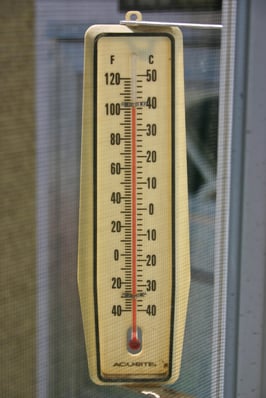In the News: An infant boy was found dead in a sport utility vehicle outside a west side daycare center, apparently left unattended by an employee of the center who picked him up, police and relatives said. The temperature was 81 degrees at 4 p.m. when a 911 caller reported that the baby, identified by family members as a 4-month-old, was found in a Dodge Durango outside the day care. Relatives, including one who is employed by the daycare, said the infant was picked up from his home that morning but was never taken inside the center.
What is Vehicular Hyperthermia?
 Hyperthermia is an acute condition which occurs when the body produces or absorbs more heat than it can dissipate. A core body temperature of 107° is considered lethal as cells are damaged and internal organs shut down. Because a child’s thermoregulatory system is not fully developed, their bodies warm at a rate three to five times faster than an adult’s. Since 1998, 386 children under the age of four have died due to vehicle-related hyperthermia.
Hyperthermia is an acute condition which occurs when the body produces or absorbs more heat than it can dissipate. A core body temperature of 107° is considered lethal as cells are damaged and internal organs shut down. Because a child’s thermoregulatory system is not fully developed, their bodies warm at a rate three to five times faster than an adult’s. Since 1998, 386 children under the age of four have died due to vehicle-related hyperthermia.
Studies have shown that in 10 minutes the temperature in a vehicle raises about 19° F. Within an hour, the temperature jumps around 50° F. Slightly rolling the window down has almost no impact on these temperature increases.
Most hyperthermia incidents occur when the child is forgotten by a parent or childcare provider. Stress and preoccupation are typically the greatest cause for such forgetfulness. In cases involving paid caregivers, 84% were prosecuted; 96% of which were convicted.
Safety Recommendations
- Never leave a child unattended in a vehicle, not even for a few minutes.
- Verify that all occupants leave the vehicle when unloading.
- Teach children not to play in or around cars.
- Always lock your car and ensure children do not have access to keys.
- Place items (purses, groceries, etc.) in the backseat as a reminder there is a child in the car.
- Check attendance at the childcare center to verify that all children are present; investigate any missing children.
- Keep all vehicles clean; it’s easier to spot children when no debris or trash is present.
First Aid – Immediate Action
If you suspect a child is suffering from heat exhaustion, call 911 immediately. While waiting for medical authorities, it’s important to quickly lower the body temperature of the child.
- Move the victim to a cool area (indoors or shaded area)
- Remove clothing to promote heat loss. – Cold compresses to the head, neck, torso, and groin will aid in cooling.
- Do NOT wrap the victim in wet towels; this can act as a heat insulator.
- Immersion in ice or cold water is dangerous and should be avoided.




